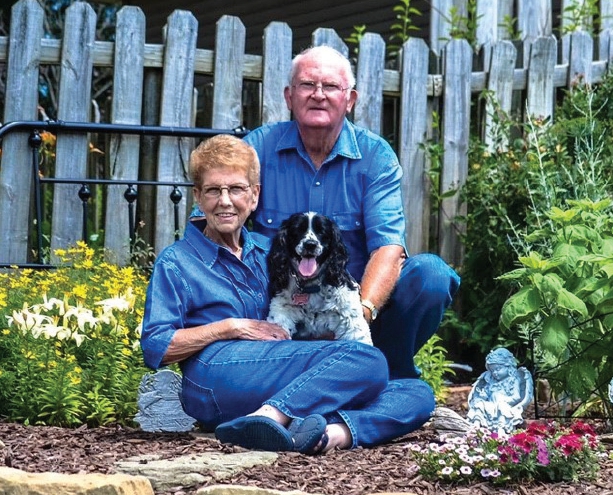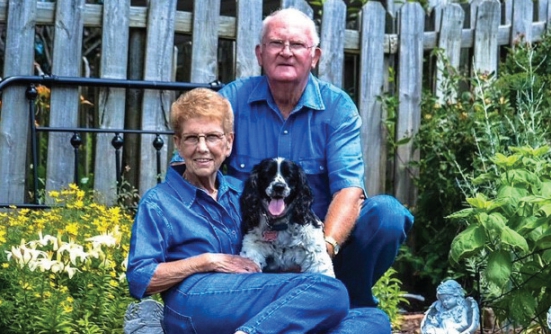
I love my small town, with a population of about 2,400 people. I was a lifelong employee of the local elementary school as the bookkeeper and secretary and retired in 1997.
My husband, Morris, was a teacher at the same school for a few years, and then he became the principal at another school in our county. We can’t run errands or go to eat out without a former student coming up to us to ask, “Do you remember me?” Sometimes we remember them, and sometimes we have to ask their name, because we met so many children through the years. But it’s a joy to see each one and find out what they are doing.
Recurrent Skin Cancer
I’m 76 years old, and skin cancer has taken a toll on my health, and it has also had an impact on my husband and our son. When I received my first diagnosis in 2014 of non-melanoma skin cancer, which included squamous-cell carcinoma and basal-cell carcinoma, my doctor recommended that I have Mohs surgery.
This is the common surgical technique used for the removal of the spots of this type of skin cancer, which is caused by exposure to the sun, and can be described as “spots” on areas of the skin that are exposed to the sun. Since then, my husband, my son, and I have all had Mohs surgery several times for this type of non-melanoma skin cancer.
My dermatologist, Michael Crowe, MD, has been treating me at Owensboro Dermatology in Kentucky since 2014. This means I have to drive about an hour to his clinic.
Endless Surgeries
I’ve had at least 30 Mohs surgeries since my first diagnosis. I’ve had this type of skin cancer on my scalp several times, so I had to cut my hair and shave a place large enough for a bandage. This has been an emotional rollercoaster event, losing my hair and having to wear a cap; it’s just awful.
I have also had several surgeries on my face, neck, ears, and arms to remove the cancerous spots, and I’m all scarred up.
I have adrenal insufficiency associated with Crohn’s disease, which means that I have low levels of adrenaline, a stress hormone, and therefore my body doesn’t handle stress well. I have to increase my medication for Crohn’s disease just to get through the stress that is caused by the surgeries; sometimes the extreme fatigue would last several days, or even weeks.
When skin cancer spots from the squamous-cell and a few basal-cell carcinomas became more frequent, the surgeries wiped me out. At my last surgery in November 2021, I felt bad for 3 months, and by the time I felt better, it was time to go back for a checkup, and go through everything all over again.
After multiple recurrences of the skin cancer and multiple surgeries, I wanted to try another type of treatment, hoping to have fewer side effects.
A New Treatment Option
One day I told my nurse, Jessica Ballard, that I wasn’t sure I could continue with those surgeries. So Jessica and Dr. Crowe told me about a new non-surgical treatment that involves low-energy radiation for a short duration.
That type of radiation is delivered via a RADiant system, using low-energy radiation to remove non-melanoma skin cancer, which is a non-invasive treatment option that is now offered to patients with frequently occurring skin cancer of this type. As I learned more about this option, I decided to consider it instead of another surgery on my neck and face.
I also found out that Dr. Crowe could treat me from his office, and I would only have to go there twice a week for 5 weeks, instead of the daily radiation therapy that can last 5 weeks at the hospital. It seemed a better option, and I thought that I should try this new option. I decided to give the low-energy radiation treatment a try and see how I do.
Success with Low-Energy Radiation
After the first round of the 3 radiation treatments for the first 2 of 4 tumors, I had no problems and no side effects, and I was very pleased. After the second set of 5 weeks (twice a week) to the other 2 tumors, I was a little tired, but not the way I had been from the Mohs surgeries.
I am finishing up my third round of 2 more tumors with the superficial, low-energy radiation, and so far, my body handles these treatments much better than the surgery.
Dr. Crowe explained that the 5-year cure rate of surgery is 99%, and the 5-year cure rate with low-level radiation is about 97%.
I have been very pleased with the radiation treatment, which worked so much better for me overall. It is especially suited for my areas on the head and neck, where most of my cancerous spots were. In addition, this type of radiation doesn’t penetrate the body as much as other types of radiation, and I had fewer side effects than with the surgery.
My goal is to deal with all these skin cancer spots and go on. I trust my doctor with my checkups, and we’ll see what the future holds.
There Are Options
If you have first-time basal-cell carcinoma or recurring skin cancer, you may want to ask your doctor questions and check out your treatment options, especially if you must get skin cancer removed on your face or ears.
What was right for me may not work for everyone, but people should know that there are new options today other than surgery for the common types of skin cancer.















